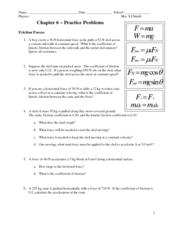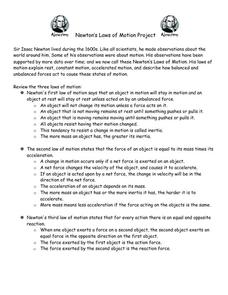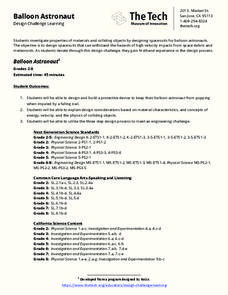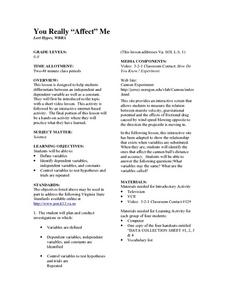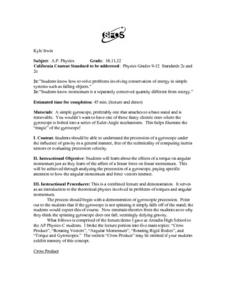Curated OER
Chapter 6 - Practice Problems: Forces
Zip through 13 physics problems with force! Equations are printed in large text in the upper-right corner of the page. Pupils change friction forces, deal directly with Newton's second and third laws of motion, and name fundamental...
Sharp School
Newton’s Laws of Motion Project
After a review of all three of Newton's laws, physical scientists complete a choice project. They can create a book in which they collect pictures where the laws of motion are depicted, produce a PowerPoint presentation, or produce a...
Bowels Physics
Refraction and Lenses
Every object we see must pass through a lens, but how does each individual's lens differ? Learners explore the science behind refraction and lenses, uncovering the details that allow them to perform daily activities.
Flipping Physics
AP Physics 1: Simple Harmonic Motion Review
Does your class feel unprepared for the upcoming exam? Use this video to review the simple harmonic motion concepts that will appear on the AP Physics exam. While maintaining interest and a fast pace, the presenter not only reviews the...
Teach Engineering
Energy on a Roller Coaster
Roll with your class into the idea of conservation of energy. Pupils use a roller coaster track to collect data to reinforce the concept of conservation of energy and the influence of friction. Class members then create a graph from...
Urbana School District
Momentum
Here's a presentation that not only covers momentum, impulse, conservation of momentum in both one and two dimensions, angular momentum, torque, and the moment of inertia, but offers many applied guided practice problems as well.
EngageNY
Interpreting the Graph of a Function
Groups sort through NASA data provided in a graphic to create a graph using uniform units and intervals. Individuals then make connections to the increasing, decreasing, and constant intervals of the graph and relate these connections...
Tech Museum of Innovation
Balloon Astronaut
Design protection from high-speed particles. The STEM lesson plan highlights why astronauts need protection from space debris. Pupils use the design process to design, build, and test a spacesuit that will protect a balloon from a...
LABScI
Kinematics: The Gravity Lab
Falling objects can be brutal if you don't protect your noodle! Scholars explore the motion of falling objects through measuring short intervals to determine if the distance traveled varies with time. Building off of this, scholars...
Teach Engineering
Exploring Energy: Kinetic and Potential
The potential of the energy in the class is moving. The third segment in a six-part unit on energy provides a deeper understanding of kinetic and potential energy. Learners understand the relationship between mass, speed, and energy and...
Curated OER
A Moving Experience - Forces and Inertia
Students consider the first part of Newton's First Law of Motion, the Law of Inertia of objects at rest, which states that every object remains at rest unless acted on by a force. They perform hands-on experiments which demonstrate this...
Curated OER
You Really "Affect" Me
Middle schoolers examine the effects of variables. They view a video which introduces the concepts, take part in an internet-based activity, then engage in a hands-on activity which allows them to practice what they have been studying.
Curated OER
Gyroscopes in Motion
Physics stars will enjoy learning about the conservation of energy as you demonstrate gyroscope precession. The lecture is broken into five subtopics: cross product, rotating vectors, angular momentum, rotating rigid bodies, and torque...
Curated OER
Free Up the Ketchup!
Learners, in teams, use given materials and their knowledge of Newton's First Law to create a device that will remove a sticky ping pong ball from a 16-oz. cup (which represents ketchup stuck in a bottle.)
Curated OER
Freestanding Structures: A Tech Museum Floor Activity
Students attempt to design the tallest structure that they can with the given materials which are wooden dowels and rubber bands. They discuss the physics of their structure and how they would improve it the next time they built a...
Teach Engineering
Can You Take the Pressure?
Do not let the pressure get to you. The first lesson in a unit of 22 introduces the concept of air pressure. Using background knowledge, the resource gives teachers the information they need to discuss how people measure air pressure and...
Curated OER
Swinging Pendulum
Students engage in an activity which demonstrates how potential energy (PE) can be converted to kinetic energy (KE) and back again. Given a pendulum height, students calculate and predict how fast the pendulum will swing by understanding...
Teach Engineering
Equal and Opposite Thrust in Aircraft: You're a Pushover!
It's the law—every action requires a reaction, no matter how small. Pupils experience two demonstrations of Newton's third law of motion as it relates to thrust in the 10th segment of a 22-part unit on flight. Using their mathematical...
Curated OER
Speed
Fifth and sixth graders practice working in pairs to determine whether they can walk with constant speed. They test themselves, collect their data, draw graphs with their data collected, manipulate the data, and then draw conclusions...
Explore Learning
Quadratics: Polynomial Form
Throught this subscription-based sight, learners explore different aspects of the parabola by changing equations from standard to vertex form. Next, find the general form of the vextex based on the values of a, b, and c, and investigate...
Curated OER
Finding Ocean Depth
How to oceanographers measure the sea's depth? Your scientists will step into their shoes in this application worksheet, first reading about how the speed of sound and a simple formula give scientists a depth estimation. Students...
Curated OER
Worksheet 3: Graphing Speed and Time
In this graphing speed and time worksheet, learners answer 7 questions regarding graphing, speed, distance, derivatives, Newton's method and wheel radius.
Lewiston High School
Weight and Mass & Forces in Equilibrium
I would weigh less on the moon? Send me there, then! On the top of the first page, a cartoon image demonstrates the difference between Earth and the moon. It then goes on to describe weight and mass and provides five practice problems...
Curated OER
Applying the Pythagorean Theorem to find Distances Between Cities
Students solve problems using the Pythagorean Theorem. In this geometry lesson, students identify the Pythagorean Triple and use it to solve real life problems.
Other popular searches
- Speed Velocity Acceleration
- Constant Velocity
- Velocity and Acceleration
- Average Velocity
- Speed and Velocity
- Angular Velocity
- Average Speed and Velocity
- Relative Velocity
- Speed & Velocity
- Terminal Velocity
- Escape Velocity
- High Velocity Impacts


